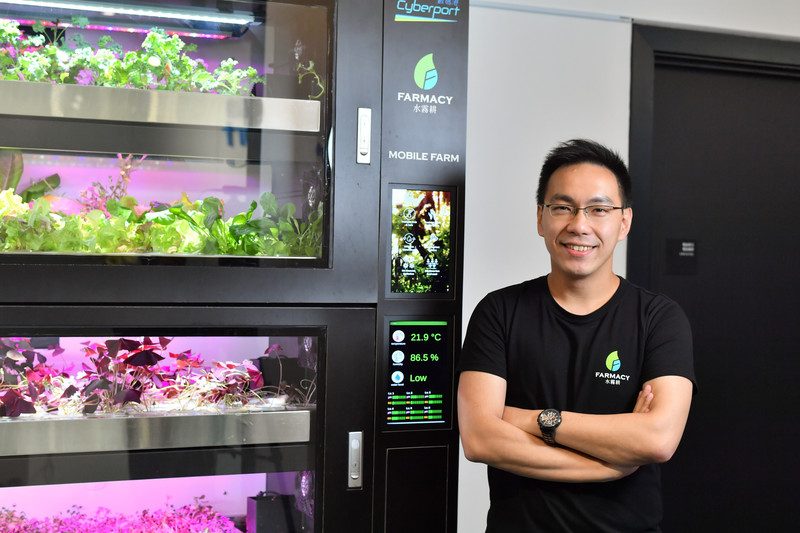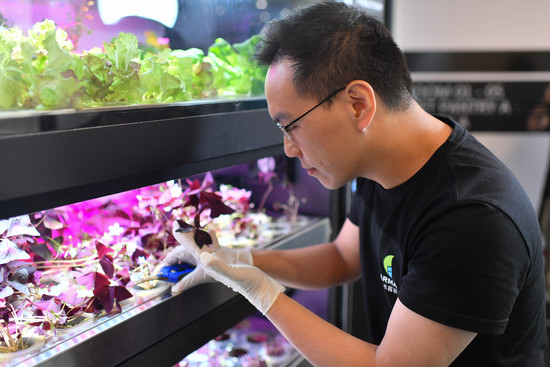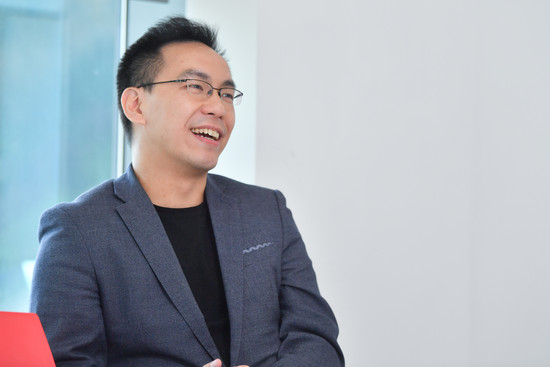
Raymond Mak - A green haven in the concrete jungle
Farmacy HK is the brainchild of Raymond Mak (MBA 2017), the HKU Business School alum bringing rare herbs and greens to Hong Kong.
Buying fresh herbs and greens in Hong Kong is a nightmare for many people. Supermarkets often stock over-priced produce lacking in freshness and flavour, shipped from thousands of miles away. We hear the oft repeated line: Hong Kong doesn’t have the space for farming, how can there be fresh greens here?
Raymond Mak has decided to turn this notion on its head. He is Co-Founder and CEO of Farmacy HK, an urban farming technology company that launched in January 2018. Amongst the high-end fashion brands in Causeway Bay, Farmacy HK is growing leafy greens, rare herbs, microgreens and edible flowers. If it seems incongruous, in a city where 98.2% of the agricultural products are imported, it is. Almost all edible flowers and rare herbs were imported.
A homegrown revolution

Microgreens, edible flowers and rare herbs are hard to find at good quality, so why not just grow them in urban spaces? In Cyberport, where Farmacy HK is based, Raymond is opening up a Smart Mobile Farm, where the greens grow with nutrients fed by water, not soil, allowing for easy indoor growing. Farmacy is the first “Agri-Prop” technology company in China and Asia that builds decentralized smart mobile in-store farms with cloud-based innovative technology application in highly urbanized cities. No bad smells or pests, it is made perfectly for Hong Kong’s small spaces. He takes out rare herbs to try, including lime basil, nasturtium and oxalis which offer zingy, tarty notes and a sharp vibrancy. But these herbs are still very niche – who is in the market for such a product?
It turns out that many people indeed are, as herbs can be snipped at the very last moment, allowing for retention of nutrients, which are often lost during long-haul transportation – most vegetables and herbs take seven days to come to Hong Kong. Food waste is also reduced dramatically as plants are only cut as they are needed, which fits into the trends of zero trace and lower wastage in food.
Having gone from a consultancy career, Raymond found that Farmacy HK was attracting high-end restaurants for its ultra-fresh and rare offerings, one of which was in the same building as his old company. “I found it ironic delivering edible flowers to the same place I used to wear a suit and tie in,” says Raymond. The partnership with this Michelin starred restaurant lasted until they changed their menu, which was actually fortuitous. “We were in our learning phase so we had actually run out of flowers, but they suddenly changed the menu before we used the last herb – a learning experience for us,” Raymond says.
Growing pains
Raymond and the Farmacy HK team took some time to learn the growth cycle and methods, light intensity, humidity, pH values, electric conductivity (EC) and all associated technology to create an ideal environment for plants. “We went through many pain points and learned so much, facing challenges from technology to logistics, and rent. We had to find places to allow us to make a small-scale farm close to the final users that allowed for scalability,” says Raymond.
Since Farmacy HK began it has been all action for Raymond. He has set a trial urban farm in Hong Kong. Anyone who has tried gardening in this city will know that the combination of heat, humidity and sudden downpours can make it impossible to grow delicate plants. It is why the urban farming concept works, and now several supermarkets are ready to try it out for themselves, both in Hong Kong and Southeast Asia.
The sustainable zeitgeist
Raymond says the success is a vindication of going through recent months which has been rough. “We were slightly delayed by Covid-19 as we were not able to travel, but we have overcome the difficulties, and things are getting more stable. And a bonus has been people are starting to have healthy lifestyle awareness as well.”
With the likes of Beyond Beef, Impossible, and OmniPork and Green Common getting more popular in Hong Kong, Farmacy HK fits right into the trend. Farmacy HK currently enable supermarkets, restaurants, hotels, green retail stores and households to farm the highest quality standard, safe, nutrient-rich and affordable crops with pioneer indoor farming technology, full automation and modular capabilities. In the future, the team is helping out with a farm-to-table café in Cyberport with a local coffee brand, including innovative signature drinks and savoury dishes with Farmacy HK’s herbs on top. “Lots of people are interested but they hesitate to interact with the farm, so we still need to work on it,” says Raymond of Farmacy HK’s urban farming roadshows that are also helping spread the word.

Ground up roots from HKU
Raymond and his co-founders started Farmacy HK in the HKU Business School MBA’s famed Business Lab, an elective course which takes students through every step of the startup process, from idea conception to launch, so the concept has its roots directly from Raymond’s alma mater. “I’m heavily rooted here, my bachelor is from HKU and I was President of the Student Union, so HKU is always in my heart. But doing the MBA, was the result of pressure from my friends as I’ve always been reluctant to do so. But it turned out to be an amazing journey that ultimately changed my life. HKU gave me the opportunity to meet people from all types of backgrounds, and allowed me to get the invaluable experience to be the head of a startup.”





